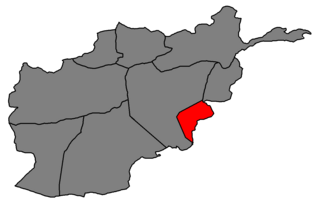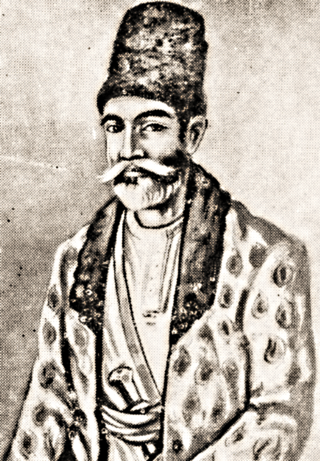Arif Khan or Mohammad Arif Khan was a Mujahideen warlord in Afghanistan and Pashtun leader from the village of Zakhel. He was a military commander and the Taliban governor of Kunduz province. An account indicated that he might have served under or was associated with the militant commander Eshan-Sayad Mirza.

Colonel General Abdul Kadir Dagarwal, commonly known as Abdul Qadir, was an Afghan military officer and politician. He was a participant of the 1973 Afghan coup d'état that created the Republic of Afghanistan under President Dawood Khan, and later directed the Afghan Air Force and Army Air Corps squadrons that attacked the Radio-TV station during the Saur Revolution.
Tora Ghar is an area in Afghanistan, also known as the Black Mountains, and is located approximately six miles north of Kandahar. Several skirmishes between American troops and Taliban fighters have occurred in Tora Ghar.

The Battle of Jamrud was fought between the Emirate of Afghanistan under Emir Dost Mohammad Khan and the Sikh Empire under Maharaja Ranjit Singh on 30 April 1837. Afghan forces confronted the Sikh forces at Jamrud. The garrisoned army was able to hold off the Afghans till Sikh reinforcements arrived to relieve them.

The vice president of the Islamic Republic of Afghanistan was the second highest political position attainable in the Islamic Republic of Afghanistan. The vice presidents were elected on the same ticket as the president. A presidential candidate was responsible for nominating two candidates for vice president before the election.
Sayyid Ali Beheshti was a leader of the Shia Hazara ethnic group of Afghanistan, who became president of the Shura-yi Enqelabi-yi Ettefaq-i Islami-yi Afghanistan. Born in Bamyan province, Beheshti was educated in Iraq where he became a modarres. In the 1960s he returned to Afghanistan and founded a madrasah in Waras, which became his stronghold. He also was a speaker at the Afghan parliament, until the communists took power in 1978.

Ghulam Haidar Rasuli was an Afghan military officer, who from 1977 to 1978, served as the Minister of Defense of Afghanistan.
Ludwig W. Adamec was an Austrian scholar on the Middle East and Afghanistan. He was a professor emeritus in the School of Middle East and North African Studies at the University of Arizona. He wrote and edited numerous books, including the republication of the monumental Historical and political gazetteer of Afghanistan, which had originally been compiled but was unpublished by the government in British India.
The Sulaimankhel, or Suleiman Khel, are a Pashtun sub-tribe of the Khilji tribe. As they are primarily Nomadic People. In the early 20th century, the tribe was recognized as generally pastoral.

The Khost rebellion, also known as the 1924 Mangal uprising, the Khost revolt or the Mangal Revolt was an uprising against the Westernization and modernizing reforms of Afghanistan’s king, Amanullah Khan. The uprising was launched in Southern Province, Afghanistan, and lasted from March 1924 to January 1925. It was fought by the Mangal Pashtun tribe, later joined by the Sulaiman Khel, Ali Khel, Jaji, Jadran and Ahmadzai tribes. After causing the death of over 14,000 Afghans, the revolt was finally quelled in January 1925.

Bārakzai is the name of a Pashtun tribe from present-day Kandahar, Afghanistan. '"Barakzai" is a common name among the Pashtuns and it means "son of Barak" in Pashto. According to the Encyclopædia Iranica, "In the detailed Pashtun genealogies there are no fewer than seven instances of the ethnic name Bārakzī, at very different levels of tribal segmentation. Six of them designate simple lineages within six different tribes located in the Solaymān mountains or adjacent lands... The seventh instance, on the other hand, designates one of the most important Pashtun tribes in numbers and historic role, part of the Zīrak branch of the Dorrānay confederation.
The following is a timeline of the history of the city of Herat, Afghanistan.
Abdul Majid Kalakani also known as Majid Agha was an Afghan communist politician. He was the founder and leader of the Liberation Organization of the People of Afghanistan (SAMA).
The Khost rebellion was a rebellion in Khost that took place in 1912 in the Emirate of Afghanistan, and was the only serious crisis during the reign of Habibullah Khan.

Abdur Rahim Khan was an Afghan governor of Herat. He was born in 1886 in Kohistan. He served as the commander of Habibullah Khan's bodyguard from age 16. In 1921 he was promoted to brigadier. During the Afghan Civil War of 1928-1929 he joined the Saqqawists and was sent to Mazar-i-Sharif to organize a revolution. In September 1932 he was appointed by Mohammed Nadir Shah as governor of Herat. Also in 1932, he prevented a mutiny in Herat. He was appointed head of Perso-Afghan Boundary Commission in September 1934. He was appointed First Deputy Prime Minister in 1938, and then as Second Deputy Prime Minister in 1940. In January 1946, he was arrested for suspected complicity with the Safi during the Afghan tribal revolts of 1944–1947, together with his son-in-law Khalilullah Khalili. He was released in 1948.
Nazir Muhammad Sarwar Khan was the Governor of Herat, Afghanistan from August 1882 to November 1886. A loyal supporter of Abdur Rahman, he accompanied the future Amir into exile and was rewarded with high office upon their return to Afghanistan. However, he was stripped of his role after accusations of corruption, and died in prison.
Saad-ud-Din, later Kazi Saad-ud-Din Khan, was a politician in Afghanistan under Abdur Rahman Khan and Habibullah Khan; he was, for a time, Habibullah Khan's father-in-law. He was the Governor of Herat for eighteen years, between 1887 and 1904, and he became the Chief Justice in 1914. He was bestowed the title "Khan e Ulum", which translates to "Master of Knowledge".
Bani Afghan is a village in the Mianwali District of Punjab Province, within Kala Bagh in Pakistan. The village has an elementary school and is primarily inhabited by Pashtun tribes from various areas, including Kutch Tander Khel, Borh Khoi, Asghari, Kayaki, Kani, and Jamrah. The village is about 4 kilometres from the CPEC and Massan railway station, serving as a gateway to Attock District and providing connections to Chakrala and Bin Hafiz Jee.

Yar Mohammad Khan Alakozai bin Abdullah Khan was the vizier of the Principality of Herat from 1829 to 1842, and the ruler of Herat from 1842 until 1851. He was born in 1790 into the Alakozai tribe. In 1829, he became vizier, or chief minister, of Herat. In 1842, he deposed his Emir, Kamran Shah Durrani, and became the new ruler of Herat. He expanded the country's domains to the Chahar Wilayat and Lash-Joveyn before dying in 1851. He held a marriage alliance with Akbar Khan, a Barakzai prince, general, and later the emir of Afghanistan for a year.
Ali Ahmad Khurram was an Afghan politician who was assassinated while serving as the minister of planning.



























